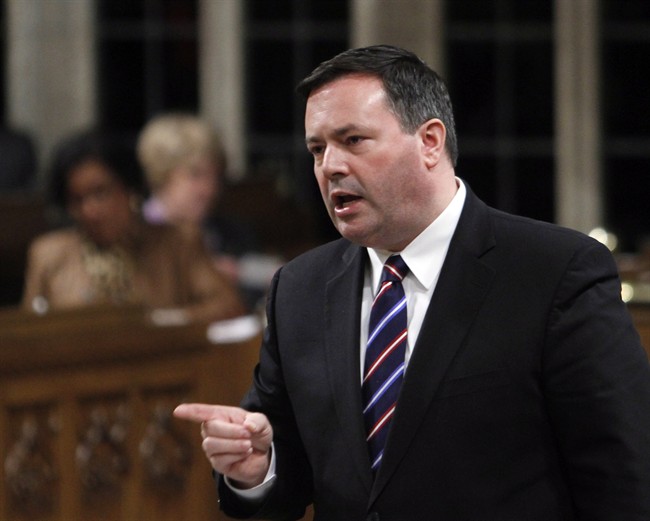OTTAWA – Employment Minister Jason Kenney took action on Thursday against the government’s scandal-ridden temporary foreign worker program, banning restaurants from accessing the program amid a roar of criticism.

Hours after the C.D. Howe Institute said the program had spurred joblessness in B.C. and Alberta – two Tory strongholds – Kenney issued the surprise moratorium.
It came despite his insistence in recent weeks that only a small number of companies were abusing the program and his repeated vows to deal with those bad actors harshly, including with fraud charges if necessary.
READ MORE: McDonald’s involved in foreign worker fuss
“I am announcing an immediate moratorium on the food services sector’s access to the temporary foreign worker program,” Kenney said in a statement.
He added his ministry will not process any new or pending applications for temporary foreign workers from the food services sector, and any unfilled positions tied to previous approval will not be suspended.
“This moratorium will remain in effect until the completion of the ongoing review of the temporary foreign worker program,” he said.
Hundreds of Canadian companies and governmental departments employ temporary foreign workers, according to data compiled by Kenney’s department. But there’s been an especially dramatic increase in the number of hotels and restaurants accessing the program under the Conservatives.
Fast-food giant McDonald’s has announced it is freezing its participation in the program pending a third-party audit after it found itself in hot water for hiring temporary foreign workers in B.C.
The program – originally designed to address shortages of skilled workers, not to recruit menial labour – has ballooned from about 100,000 people in 2002 to as many as 338,000 now working across the country, according to the C.D. Howe report.
The institute, a non-partisan public policy think-tank, said changes to the program enacted between 2002 and 2013 made it much easier for employers to hire temporary foreign workers. Alberta and B.C. were particular benefactors.
In that time period, the study concluded, a cumulative 3.9 percentage points was added to the unemployment rates in the western Canada.
“These policy changes occurred even though there was little empirical evidence of shortages in many occupations,” writes the report’s author, economist Dominique Gross.
“When controlling for differences across provinces, I find that changes to the TFWP that eased hiring conditions accelerated the rise in unemployment rates in Alberta and British Columbia.”
The Conservative government has since tightened the regulations, but there have been a spate of high-profile allegations in recent months about an array of employers – particularly restaurant operators – abusing the program.
The C.D. Howe study, however, says that although the government’s 2013 crackdown on the program was a welcome move, it’s probably insufficient because of the absence of solid data about the state of Canada’s labour market.
That echoes concerns raised by Don Drummond, a respected economist who has given the Tories 69 recommendations to improve the quality of the information on Canada’s labour markets. Most have not been implemented.
Gross recommended several reforms to the program, including compiling better data on whether labour shortages exist in Canada. She also called for increasing the cost of a temporary foreign worker permit for companies, and said employers should face tougher rules forcing them to prove they’ve truly been unable to fill jobs with Canadian workers.
Until then, she wrote, a temporary quota should be placed on the number of foreign workers permitted to come to Canada.
In response to the C.D. Howe report, a Kenney spokeswoman cited a Statistics Canada finding that the impact of temporary foreign workers on employment estimates is negligible, representing just two per cent of overall employment.
Alexandra Fortier also repeated what is becoming a common refrain from the government amid a growing chorus of criticism.
“Canadians must always be first in line for available jobs,” she said in an email.
“Our message to employers is clear: We will not tolerate any abuse of the temporary foreign worker program. We have made reforms to the temporary foreign worker program to ensure that Canadians are first in line for available jobs and to ensure that employers do not take advantage of foreign workers.”
But within hours, Kenney had blinked.
Both the federal Liberals and the NDP have been loudly demanding the government take serious action on the temporary foreign workers program.
Liberal MP John McCallum has written to the auditor general asking for an audit of the program as soon as possible, while the NDP urged the government to freeze the program entirely until the potential for abuse is addressed.
“There are people living here in Canada who are being laid off or having their hours cut to facilitate the use of foreign workers; this needs to end immediately,” NDP immigration critic Jinny Sims told a news conference Thursday outside a McDonald’s restaurant in Victoria.
“Even McDonald’s has taken action – why hasn’t the government?”
One expert on temporary foreign workers said she doubts many of the Canadian companies routinely accessing the program are seriously trying to find domestic workers.
“Instead of recruiting in India, you could recruit in some parts of rural Ontario, or among First Nations in western Canada,” said McMaster University’s Catherine Connelly, who was recently awarded a four-year grant to study the program.
“If you look at unemployment rates among young Canadians or among people with disabilities – I really question some of the recruiting practices.”



Comments